“The fourth wall is like the Berlin wall at this point. It’s only a matter of time.” —iaddedarainbow
In the world of theater, the term “fourth wall” refers to the invisible wall that divides the characters from the audience. In the untamed, sprawling, creative world of fandom, the fourth wall refers to the invisible line of cover that shields fans from the outside world. The fourth wall is what we think of as our security: a battlement of protection keeping our wild, pioneering settlement safe—right up until it fails to protect us.
Even after four decades of steady production, the idea of fanfiction, fan-art, slash, and fans otherwise doing whatever they/we want with other people’s characters still shocks and scandalizes many. The fourth wall is what insulates us, protecting us from their often harsh judgment, and sometimes even from real-life repercussions. A mix of Fight Club-like codes of silence (the first rule of fandom: do not talk about fandom) and Don’t Ask, Don’t Tell-level feigned ignorance, this imaginary wall is what creates an impregnable barrier between fandom and everybody else.
Except that it doesn’t. Not even a little bit.
***
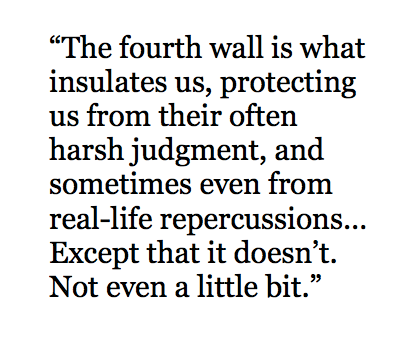 Because of the current stigma that all fanfiction is either porn, plagiarism, or otherwise creepy and gross, many fans don’t enjoy the privilege of owning their own fan activities. We fear that being “outed” as a fanfic writer or fanartist may result in being fired, getting kicked out of our community or religious groups, having our Internet access taken away, or seeing our friendships end. This isn’t melodrama; each of these things has happened to people I know. Being outed as a writer of fanfiction can have serious consequences. I say this having experienced many of the items on that list firsthand myself.
Because of the current stigma that all fanfiction is either porn, plagiarism, or otherwise creepy and gross, many fans don’t enjoy the privilege of owning their own fan activities. We fear that being “outed” as a fanfic writer or fanartist may result in being fired, getting kicked out of our community or religious groups, having our Internet access taken away, or seeing our friendships end. This isn’t melodrama; each of these things has happened to people I know. Being outed as a writer of fanfiction can have serious consequences. I say this having experienced many of the items on that list firsthand myself.
So most fans write using pseudonyms and take other precautions to avoid having fan practices associated with their real-life identities. But that doesn’t quell the internal fear and dislike of having outsiders judge fandom. So we have reached a stage where the last thing that many fans want is an increased interaction with the media, or with the creators of the canonical works we write about—in fact with almost anyone who’s not a fan themselves. We’ve created a cozy safe haven, where we think we won’t be judged for our works.
Four months ago, I was very politely, but very firmly, refused entry to Vividcon. “It’s not that you’re not fannish,” one of the con organizers told me. “It’s that we don’t want press around.” They had every right to be leery. The track record of fandom portrayals in the media is abysmal. From 2002 to 2012, most articles on fandom still sound distressingly alike: the media discovers us, zeroes in on something potentially shocking about us, then focuses on that —usually with a tone of schadenfreude or even revelry—to the exclusion of everything else. The prevailing feeling is that, when the media comes calling, it’s better to hide behind the fourth wall than to speak out. The logic, of course, is if they don’t see us, they can’t hurt us. But already they can see us, and they do hurt us. 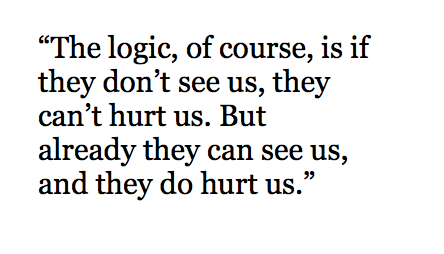
Positive interactions between fans and the creators/gatekeepers of the works fans love so passionately (known as TPTB, short for The Powers That Be) is even less rosy. There was the time, for example, William Shatner told us all to get a life. Or that time Gene Roddenberry explained to fans that Kirk and Spock totally weren’t lovers, not that there’s anything wrong with that. Or that time a fan made the Phelps brothers do a PSA about twincest. And the time Diana Gabaldon called fanfic writers the equivalent of white slavers (yes, really). There’s a long history of this, all the way back to the time in 1813 when Jane Austen told her niece (who apparently wanted to roleplay with her as Darcy’s sister, Georgiana), that she couldn’t possibly because she had no idea how Georgiana might write.
In short, the relationship between fans and the authors of their canons has always been fraught.
***
I bumped headlong into the fourth wall even as I was editing this piece about the fourth wall. While finishing an article dealing with a particular community, members of that fandom panicked at the intrusion of media into their online world. They began locking their fanfiction, which was previously public, so that if my article brought other members of the press to their door, they would be “safe.” I watched the panic from outraged fans with dismay, and I listened. I chose not to publish the article. I’m still not certain that was the right decision for me as a journalist—but it was the right decision for me as a fan, understanding all too well the possible fallout.
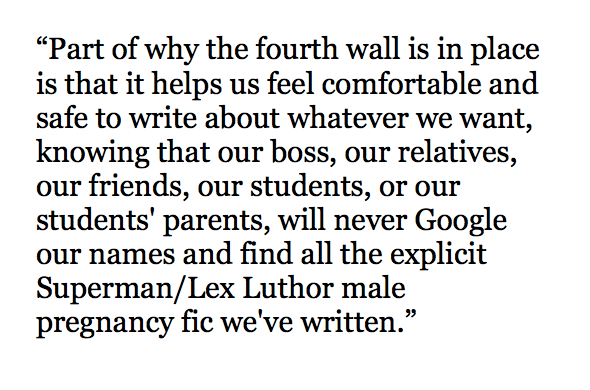 Ironically, just days after the controversy over my own stalled article, one of the main subjects of that fandom discovered a fandom primer about himself. Many fans quickly deleted their comments and hid their works, but they could not control the fact that the outside world had discovered their creations.
Ironically, just days after the controversy over my own stalled article, one of the main subjects of that fandom discovered a fandom primer about himself. Many fans quickly deleted their comments and hid their works, but they could not control the fact that the outside world had discovered their creations.
This incident underscores both how important the fourth wall is to fandom, but also how great a need there is to stop hiding behind the illusion that the fourth wall will protect us.
I’m absolutely not suggesting that we should all start posting tentacle porn under our real names *cough* and I emphatically support the right to create fanwork under a safe alias that can never be connected to your real life identity. The freedom to create without fear of judgment or real-life repercussions is a huge and important part of fandom that should always remain intact. And part of why the fourth wall is in place is that it helps us feel comfortable and safe to write about whatever we want, knowing that our boss, our relatives, our friends, our students, or our students’ parents, will never google our names and find all the explicit Superman/Lex Luthor male pregnancy fic we’ve written.
What I am suggesting is that if we’re ever to get to a point where, in the event someone does get outed as a writer of fanfic, the reaction from outsiders is, “Oh, that’s no big deal,” instead of shock and horror or even damaging real life repercussions, then a number of things have to change, starting with the way we as fans act about our own creative output.
If we act ashamed of our work, how can we expect other people not to treat it shamefully? We are creating these works in what is, at heart, a public sphere. The public is already a part of what we do—and we need to get a lot more comfortable with that.
As a longtime fan, I’ve seen every possible reaction to fanfiction—everything from “Cool, got any recs?” to bemusement to mockery. My personal favorite was, “What you do is the devil’s work.” What’s consistent through it all is how largely fandom manages to be misunderstood, even by people who should know better. 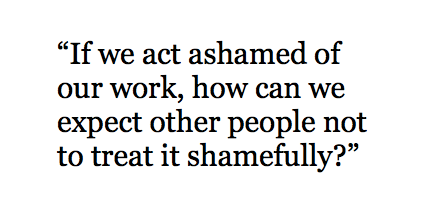
In 2010, at the first annual Book Blogger Con, keynote speaker Maureen Johnson polled a room full of publishers, agents, and publicists to ask how many of them knew what fandom was. Fewer than half raised their hands. I was stunned; how could the publishing industry not be aware of what fanfic writers were doing right up against their backs? Was the widespread trend of “filing off the serial numbers”—taking a fanfic, changing the names of the characters to original characters, then publishing it, which is well-known in fandom—so unknown within the publishing industry?
No wonder Fifty Shades of Grey took them all completely by surprise.
***
Fifty Shades changed everything we knew about publishing and fandom. It took the “wink-wink-nod-nod” status of fandom within the media and made fandom almost passe instead of shocking. It dragged fans and fanfiction into the spotlight. Before 2012, trying to publish your fanfiction was a certain path to a lawsuit; in 2012, many people, including publishers, seemed to suddenly view it as a shortcut to success. Wherever Fifty Shades was mentioned, fanfiction was sure to follow. Forty million copies later, you can wring your hands as much as you want, but the truth is that fandom is mainstream.
And it wasn’t just Fifty Shades. Bronies, Teen Wolf, One Direction, Homestuck, The Hunger Games—this was the year fandom’s interaction with the outside world changed, dramatically. Members of mainstream media do now routinely interact with us. They camp outside Twilight premieres with movie fans, interview fans of One Direction, send hordes of press to Comic Con. It’s common for TPTB to make decisions with their fanbases in mind. Avengers fandom is so big it influences entire policy decisions at Marvel. Last year, the producers of Community asked a fan’s permission before parodying a fanvid she made on the show itself. Fandom is an active part of Internet culture and an active concern for the entertainment industry. 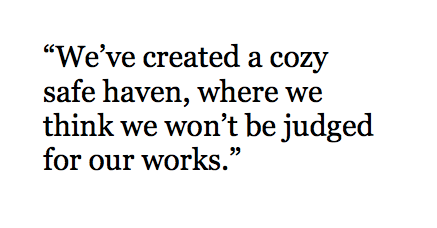
And yet the lie of the fourth wall persists.
The truth is, I entirely understand why it does—perhaps more immediately than many others. It’s a nice lie, one we tell in order to protect ourselves from the continual intrusion of assholes like Rob Bricken. Many critics of fandom are men who mock female-dominated fandom as being all about “porn,” without ever actually understanding what fandom is as a community. These critics definitely do not recognize how fanwork fits into larger cultural traditions of reworking: from Virgil’s epic Homeric fanfic, The Aeneid, to Milton’s Bible fanfic, Paradise Lost.
***
Fans rely on the fourth wall to try and minimize the damage that people outside of fandom can do when they look in on us. But my own experience in fandom is one of constantly learning that it’s just not possible. Especially on the Internet, if our actions are public at all, then we can’t keep outsiders from peering in on fandom, seeing what we do, and then making their own judgments. Pretending like we can only makes us more vulnerable.
In some countries like Canada and Australia, you can be arrested if you cross the border with or otherwise get caught with certain kinds of fanart or fanfiction, even though it’s just fiction. Even in the U.S. and much of Europe and Asia, where fandom is a growing part of the mainstream, we still need to know copyright law, and how the fair use clause can protect us against, for example, wrongful Viacom takedowns at YouTube.
I became a cautionary tale myself nine years ago, when I lost work for a local paper because the editor found out I wrote fanfic. “I’m weirded out,” he told me. “I don’t think you’ll be working for us anymore.” It’s very rare that fans suffer professionally from fandom, but it does happen, and it did to me. Here I am, nine years later, a complete paradox. In 2003, I lost work because of fandom; in 2011 and 2012, that’s why I was hired.
The times, they are a changin’.
After the incident with my job, I resolved to represent fandom openly. It was a decision that paid off in multiple ways. The more I acted like fandom was no big deal, like fandom was actually awesome, the more I saw that attitude reflected back at me everywhere I went.
To many of us who’ve grown up with remix culture and the idea that fanworks are just one more iteration of a centuries-old practice of reworking other people’s stories, fandom is no big deal—just another thing that we do on the Internet. We need to keep talking about it in these terms, accept it for the creative and wonderful weirdness it inspires: some terrible, some wonderful, some brilliant.
***
When fans hide behind the fourth wall, we internalize shame about fan practices, and that shame keeps us from learning about fandom as a tradition and as a culture. We don’t learn about our history. We don’t learn how to defend ourselves against tirades like Gabaldon’s or Robin Hobb’s. Even less do we learn how to legally protect ourselves, or about fan-run campaigns to help us do it, like the OTW, a fan-run non-profit group set up to help represent fandom in the media and defend fans legally against restrictive copyright laws.
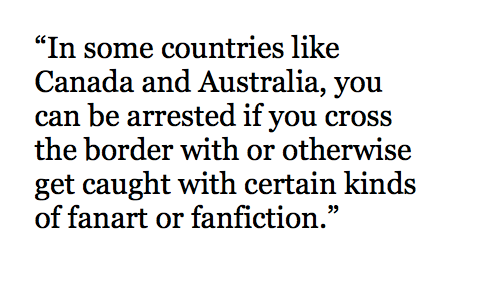 And even if we do know our history and our legal rights, avoiding interaction with the outside world is only likely to increase the harmful negative stereotypes about fanwork. Just like any other subculture, if we want respect from other people, we’re not going to get it by cowering in fear and acting as though we’re engaged in something shameful, or worse, illegal.
And even if we do know our history and our legal rights, avoiding interaction with the outside world is only likely to increase the harmful negative stereotypes about fanwork. Just like any other subculture, if we want respect from other people, we’re not going to get it by cowering in fear and acting as though we’re engaged in something shameful, or worse, illegal.
I fervently believe that if we want fandom to be represented well in the media, we have to represent ourselves. It’s a pipe dream to think that fans can keep their head in the sand while the world discovers every other fandom but their own. At this point in the evolution of fandom, hiding behind the illusion of the fourth wall is the quickest way for us to be misunderstood, misrepresented, and mocked. Stepping forward and speaking up about how awesome fandom is, though? That can make people see fandom, and fans, differently. The more fandom/creator interaction becomes the norm, the less threatened we make each other feel, and the safer fans are to do what we love without fear of harmful repercussions.
I’ve often been criticized from within fandom for attempting to forcibly drag fandom into the limelight—as if any one fan could. The reality is that I haven’t sought out any interaction with the media or TPTB. All I’ve done is wake up to the fact that the media is already here.
Perhaps because I have had so many personal experiences with the fourth wall being broken, I feel very strongly about the ways in which fandom, today, still crouches behind it in fear of what will happen when the mainstream finds out about us. Guys? Seriously? They already know.
The fourth wall crumbled long ago. It’s time for us, as fans, to try building bridges instead.
Art by Jason Reed
*This article originally appeared with a modified image of the Berlin Wall. Some readers found this choice offensive, for which we sincerely apologize. We have since swapped out the image.

